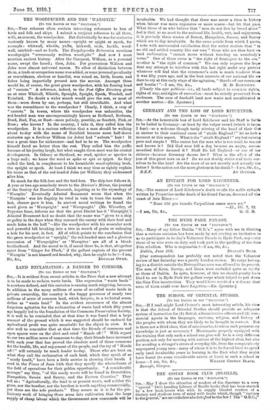LAND RECLAMATION: A DANGER TO COMMONS.
[To THE EDITOR OF THE SPECTATOR.") Srn,—It is evident from recent articles in the Press that a new attempt is to be made to reclaim waste lands. The expression "waste lands" is nowhere defined, and this omission is causing much misgiving, because, In addition to the many millions of acres of so-called waste lands in private ownership, the country is the happy possessor of nearly two millions of acres of pommon land, which lawyers, in a technical sense, define as "waste land." In the evident recurrence of the almost forgotten agitation for the reclamation of waste land which fifty years ago happily led to the foundation of the Commons Preservation Society, it is well to be reminded,that at that time it was found that a large amount of the ground which it was suggested should be enclosed for agricultural profit was quite unsuitable for the object in view. It is also well to remember that at that time the friends of commons and open spaces were on the alert and cried "Hands off ! " With regard to our two million acres of commons to-day, their friends have increased with each year that has proved the absolute need of those commons for the health, life, and enjoyment of the people, and the cry of "Hands off ! " will certainly be much louder to-day. Those who are bent on what they call the reclamation of such land, which they speak of as "sandy heath," have been a little unwise in showing their hands. I read in the TiME8 of June 14th that they specify the whereabouts of the field of operations for their golden opportunity. "A considerable acreage," say they, "of this sandy waste will be found in Dorsetshire, Hampshire, Swan and Surrey, and the Eastern Counties." They tell us "Agriculturally, the land is at present waste, and neither the gram, nor the heather, nor tho bracken is worth anything commercially, yet those are the sole products.4' They assure us it is for the pre- liminary work of bringing these areas into cultivation that the large supply of cheap labour which the Government now commands will be invaluable. We had thought that there was never a time in history when labour was more expensive or more scarce—but let that pass. What those of us who believe that "men do not live by bread alone" fool is that, as an asset to the national life, health, rest, and enjoyment, it is precisely these wastes of Dorset, Hampshire, Sussex, and Surrey which are to-day invaluable. In tho same article from which I quote, I note with unconcealed satisfaction that the writer realizes that "in an old and settled country like our own" those who are thus bent on land reclamation "cannot move without treading on somebody's corns." One of these corns is "the right of frontag,ors to the sea," another is "the right of common." We can only express the hope that any attempt to interfere with this last right under any pretext whatever will find that the commoner's corn is much tenderer than it was fifty years ago, and in the best interests of our national life we dare to cry at this early stage of the agitation, "Hands off our commons
[Clearly the ager publicu.s—i.e., all lands subject to common rights, rights of way, and rights of recreation—must ho strictly preserved from enclosure. The case of freehold land now waste and uncultivated is another matter.—En. Spectator.]


































 Previous page
Previous page